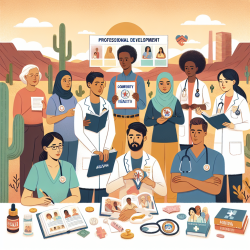Introduction
In the realm of speech-language pathology and child development, understanding the broader context of health influences is crucial. The research titled "A Strategic Program for Risk Assessment and Intervention to Mitigate Environmental Stressor-Related Adverse Pregnancy Outcomes in the Indian Population" offers valuable insights that can be translated into practical strategies for improving maternal and child health outcomes.
Understanding Environmental Stressors
Environmental stressors such as pollution, climate change, and socio-political factors significantly impact maternal health and pregnancy outcomes. In India, these stressors are compounded by high levels of pollution, with major cities like New Delhi ranking among the world's most polluted. The research highlights how these conditions increase the risk of preterm birth (PTB) and other adverse outcomes, underscoring the need for targeted interventions.
The OPERA Program: A Collaborative Response
The Optimal Pregnancy Environment Risk Assessment (OPERA) program is a collaborative initiative aimed at addressing these challenges. Supported by international organizations such as the WHO and March of Dimes, OPERA seeks to develop and disseminate accessible tools for early diagnosis and intervention. By focusing on local contexts, OPERA empowers practitioners with the knowledge and resources needed to mitigate risks associated with environmental stressors.
Practical Applications for Practitioners
For practitioners, the findings of this research offer several actionable insights:
- Early Risk Identification: Utilize OPERA's tools to identify women at risk of adverse pregnancy outcomes early in their pregnancy journey.
- Intervention Strategies: Implement experience-based interventions that build resilience and break cycles of stress transmission across generations.
- Collaborative Efforts: Engage in interdisciplinary collaborations to tailor interventions to the specific needs of the local population.
Encouraging Further Research
While the OPERA program provides a robust framework, continuous research is essential to refine these strategies. Practitioners are encouraged to contribute to this body of knowledge by conducting studies that explore the efficacy of different interventions in diverse settings. By doing so, they can help develop more nuanced approaches that cater to the unique challenges faced by different populations.
Conclusion
Incorporating the insights from this research into practice can significantly enhance outcomes for mothers and children. By focusing on early risk assessment and targeted interventions, practitioners can play a pivotal role in mitigating the effects of environmental stressors on pregnancy outcomes.
To read the original research paper, please follow this link: A Strategic Program for Risk Assessment and Intervention to Mitigate Environmental Stressor-Related Adverse Pregnancy Outcomes in the Indian Population.










